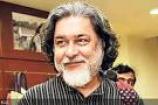No Country
Review
No Country
NO COUNTRY, Kalyan Ray’s second work of fiction, is concerned with family, nationality, assimilation, and a lot of other novel buzzwords. Perhaps most poignantly, though, it will be remembered for the questions it asks about size and scope. How large is the world in which we live? How far do our lives extend? Ray constantly probes the reader with that question in narratives both large and small. The book, which features layered chapters of epic scope that span continents, centuries and generations, always seems as though it is just on the verge of getting ahead of itself. But it succeeds because it masterfully juxtaposes the smallest and the largest of worlds, revealing each one’s perpetual containment within the other.
"Ray retains masterful control over his divergent narratives through the strength in which the original characters were grounded. Simple and sure, NO COUNTRY mostly retains its sense of longing and purpose in a large world because of the foundation upon which the world builds."
And the smallest of worlds is where we find ourselves at the start of NO COUNTRY. In a tiny, rural Irish town, we are presented with the 19th-century tale of Brendan, Padraig and Brigid. Their world is minuscule, and not only because of the isolated setting. As the book begins, in their late teenage years, they are the only children left in the schoolhouse, with all the others gone to work on their family farms. Each is very nearly the sum total of the other’s world. But when a damning priest, a stirring revolution and the potato famine sweep into their lives, the three are, rather literally, swept to the winds. The book then takes a gasping stumble into the vastness of the world, and proceeds on a trek through their vastly divergent lives in Ireland, India and America, coming to span centuries and generations.
Ray retains masterful control over his divergent narratives through the strength in which the original characters were grounded. Simple and sure, NO COUNTRY mostly retains its sense of longing and purpose in a large world because of the foundation upon which the world builds. We retain an intimate knowledge of people who will never see each other again, and that knowledge stays with us, even as they grow farther and farther from one another. Ostensibly, the book centers on the divergent lives of Padraig and Brendan, the two best friends whose lives irrevocably separate, but Brigid, the mother of Padraig’s child and their classmate, is just as much at the heart of the story as they are, though she dies early in the story. Indeed, she remains the connecting thread between the two characters as they travel so far, with Brendan caring for Padraig and Brigid’s child in his absence and her death. This firmly roots the plot in the smallness of that schoolhouse, described with love and care at the outset of the story.
Ray attempts to attune to the various dialogues of the times and places that NO COUNTRY visits, with general success, though some of the sections feel a bit put-on. I sense that Ray both struggles with and savors the myriad voices, places and cultures that pepper his story, and the sometimes forced nature of the dialogue and historical references is perhaps the book’s only significant detriment. Generally, though, the language is masterful and controlled.
In the end, NO COUNTRY manages to hold in the palm of its hand both the very small lives of those three Irish teenagers in the schoolhouse and a sweeping, global narrative. That persistent ambiguity elevates this from a good to a great novel. As we expect, the events turn upon themselves, and all come back together in a surprising sort of way. The book makes no bones about this; the introduction features a retiring police detective in upstate New York trying to solve a murder. He recalls some advice that we know will become pertinent: “No more than two degrees of separation --- if that --- in murder cases, unless burglary is involved. Often the unlikeliest of connections.” And indeed, a deeply contained and dispersed world rushes back into the final moments of NO COUNTRY, making the read well worth its while.
Reviewed by L. Whitney Richardson on June 27, 2014
No Country
- Publication Date: June 30, 2015
- Genres: Fiction, Historical Fiction
- Paperback: 560 pages
- Publisher: Simon & Schuster
- ISBN-10: 1451636385
- ISBN-13: 9781451636383




